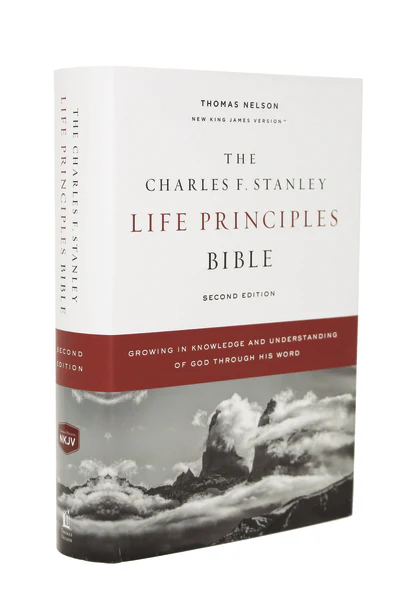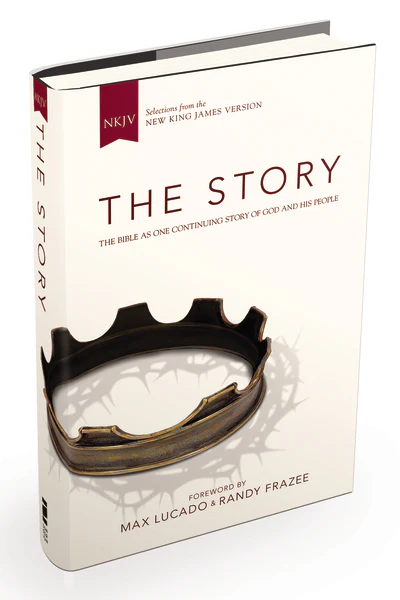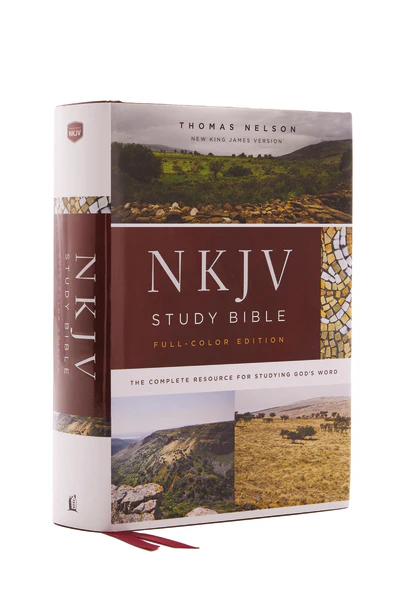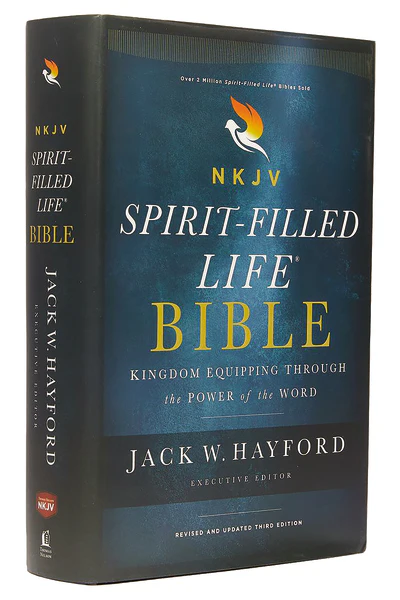Mark 4:1-20
New King James Version
The Parable of the Sower(A)
4 And (B)again He began to teach by the sea. And a great multitude was gathered to Him, so that He got into a boat and sat in it on the sea; and the whole multitude was on the land facing the sea. 2 Then He taught them many things by parables, (C)and said to them in His teaching:
3 “Listen! Behold, a sower went out to sow. 4 And it happened, as he sowed, that some seed fell by the wayside; and the birds [a]of the air came and devoured it. 5 Some fell on stony ground, where it did not have much earth; and immediately it sprang up because it had no depth of earth. 6 But when the sun was up it was scorched, and because it had no root it withered away. 7 And some seed fell among thorns; and the thorns grew up and choked it, and it yielded no [b]crop. 8 But other seed fell on good ground and yielded a crop that sprang up, increased and produced: some thirtyfold, some sixty, and some a hundred.”
9 And He said [c]to them, “He who has ears to hear, let him hear!”
The Purpose of Parables(D)
10 (E)But when He was alone, those around Him with the twelve asked Him about the parable. 11 And He said to them, “To you it has been given to (F)know the [d]mystery of the kingdom of God; but to (G)those who are outside, all things come in parables, 12 so that
(H)‘Seeing they may see and not perceive,
And hearing they may hear and not understand;
Lest they should turn,
And their sins be forgiven them.’ ”
The Parable of the Sower Explained(I)
13 And He said to them, “Do you not understand this parable? How then will you understand all the parables? 14 (J)The sower sows the word. 15 And these are the ones by the wayside where the word is sown. When they hear, Satan comes immediately and takes away the word that was sown in their hearts. 16 These likewise are the ones sown on stony ground who, when they hear the word, immediately receive it with gladness; 17 and they have no root in themselves, and so endure only for a time. Afterward, when tribulation or persecution arises for the word’s sake, immediately they stumble. 18 Now these are the ones sown among thorns; they are the ones who hear the word, 19 and the (K)cares of this world, (L)the deceitfulness of riches, and the desires for other things entering in choke the word, and it becomes unfruitful. 20 But these are the ones sown on good ground, those who hear the word, [e]accept it, and bear (M)fruit: some thirtyfold, some sixty, and some a hundred.”
Read full chapter
2 Samuel 9-10
New King James Version
David’s Kindness to Mephibosheth
9 Now David said, “Is there still anyone who is left of the house of Saul, that I may (A)show him [a]kindness for Jonathan’s sake?”
2 And there was a servant of the house of Saul whose name was (B)Ziba. So when they had called him to David, the king said to him, “Are you Ziba?”
He said, “At your service!”
3 Then the king said, “Is there not still someone of the house of Saul, to whom I may show (C)the kindness of God?”
And Ziba said to the king, “There is still a son of Jonathan who is (D)lame in his feet.”
4 So the king said to him, “Where is he?”
And Ziba said to the king, “Indeed he is in the house of (E)Machir the son of Ammiel, in Lo Debar.”
5 Then King David sent and brought him out of the house of Machir the son of Ammiel, from Lo Debar.
6 Now when (F)Mephibosheth[b] the son of Jonathan, the son of Saul, had come to David, he fell on his face and prostrated himself. Then David said, “Mephibosheth?”
And he answered, “Here is your servant!”
7 So David said to him, “Do not fear, for I will surely show you kindness for Jonathan your father’s sake, and will restore to you all the land of Saul your grandfather; and you shall eat bread at my table continually.”
8 Then he bowed himself, and said, “What is your servant, that you should look upon such (G)a dead dog as I?”
9 And the king called to Ziba, Saul’s servant, and said to him, (H)“I have given to your master’s son all that belonged to Saul and to all his house. 10 You therefore, and your sons and your servants, shall work the land for him, and you shall bring in the harvest, that your master’s son may have food to eat. But Mephibosheth your master’s son (I)shall eat bread at my table always.” Now Ziba had (J)fifteen sons and twenty servants.
11 Then Ziba said to the king, “According to all that my lord the king has commanded his servant, so will your servant do.”
“As for Mephibosheth,” said the king, “he shall eat at [c]my table like one of the king’s sons.” 12 Mephibosheth had a young son (K)whose name was Micha. And all who dwelt in the house of Ziba were servants of Mephibosheth. 13 So Mephibosheth dwelt in Jerusalem, (L)for he ate continually at the king’s table. And he (M)was lame in both his feet.
The Ammonites and Syrians Defeated(N)
10 It happened after this that the (O)king of the people of Ammon died, and Hanun his son reigned in his place. 2 Then David said, “I will show (P)kindness to Hanun the son of (Q)Nahash, as his father showed kindness to me.”
So David sent by the hand of his servants to comfort him concerning his father. And David’s servants came into the land of the people of Ammon. 3 And the princes of the people of Ammon said to Hanun their lord, “Do you think that David really honors your father because he has sent comforters to you? Has David not rather sent his servants to you to search the city, to spy it out, and to overthrow it?”
4 Therefore Hanun took David’s servants, shaved off half of their beards, cut off their garments in the middle, (R)at their buttocks, and sent them away. 5 When they told David, he sent to meet them, because the men were greatly [d]ashamed. And the king said, “Wait at Jericho until your beards have grown, and then return.”
6 When the people of Ammon saw that they (S)had made themselves repulsive to David, the people of Ammon sent and hired (T)the Syrians of (U)Beth Rehob and the Syrians of Zoba, twenty thousand foot soldiers; and from the king of (V)Maacah one thousand men, and from (W)Ish-Tob twelve thousand men. 7 Now when David heard of it, he sent Joab and all the army of (X)the mighty men. 8 Then the people of Ammon came out and put themselves in battle array at the entrance of the gate. And (Y)the Syrians of Zoba, Beth Rehob, Ish-Tob, and Maacah were by themselves in the field.
9 When Joab saw that the battle line was against him before and behind, he chose some of Israel’s best and put them in battle array against the Syrians. 10 And the rest of the people he put under the command of (Z)Abishai his brother, that he might set them in battle array against the people of Ammon. 11 Then he said, “If the Syrians are too strong for me, then you shall help me; but if the people of Ammon are too strong for you, then I will come and help you. 12 (AA)Be of good courage, and let us (AB)be strong for our people and for the cities of our God. And may (AC)the Lord do what is good in His sight.”
13 So Joab and the people who were with him drew near for the battle against the Syrians, and they fled before him. 14 When the people of Ammon saw that the Syrians were fleeing, they also fled before Abishai, and entered the city. So Joab returned from the people of Ammon and went to (AD)Jerusalem.
15 When the Syrians saw that they had been defeated by Israel, they gathered together. 16 Then [e]Hadadezer sent and brought out the Syrians who were beyond [f]the River, and they came to Helam. And [g]Shobach the commander of Hadadezer’s army went before them. 17 When it was told David, he gathered all Israel, crossed over the Jordan, and came to Helam. And the Syrians set themselves in battle array against David and fought with him. 18 Then the Syrians fled before Israel; and David killed seven hundred charioteers and forty thousand (AE)horsemen of the Syrians, and struck Shobach the commander of their army, who died there. 19 And when all the kings who were servants to [h]Hadadezer saw that they were defeated by Israel, they made peace with Israel and (AF)served them. So the Syrians were afraid to help the people of Ammon anymore.
Footnotes
- 2 Samuel 9:1 covenant faithfulness
- 2 Samuel 9:6 Or Merib-Baal
- 2 Samuel 9:11 LXX David’s table
- 2 Samuel 10:5 humiliated
- 2 Samuel 10:16 Heb. Hadarezer
- 2 Samuel 10:16 The Euphrates
- 2 Samuel 10:16 Shophach, 1 Chr. 19:16
- 2 Samuel 10:19 Heb. Hadarezer
Daniel 5
New King James Version
Belshazzar’s Feast
5 Belshazzar the king (A)made a great feast for a thousand of his lords, and drank wine in the presence of the thousand. 2 While he tasted the wine, Belshazzar gave the command to bring the gold and silver vessels (B)which his [a]father Nebuchadnezzar had taken from the temple which had been in Jerusalem, that the king and his lords, his wives, and his concubines might drink from them. 3 Then they brought the gold (C)vessels that had been taken from the temple of the house of God which had been in Jerusalem; and the king and his lords, his wives, and his concubines drank from them. 4 They drank wine, (D)and praised the gods of gold and silver, bronze and iron, wood and stone.
5 (E)In the same hour the fingers of a man’s hand appeared and wrote opposite the lampstand on the plaster of the wall of the king’s palace; and the king saw the part of the hand that wrote. 6 Then the king’s countenance changed, and his thoughts troubled him, so that the joints of his hips were loosened and his (F)knees knocked against each other. 7 (G)The king cried [b]aloud to bring in (H)the astrologers, the Chaldeans, and the soothsayers. The king spoke, saying to the wise men of Babylon, “Whoever reads this writing, and tells me its interpretation, shall be clothed with purple and have a chain of gold around his neck; (I)and he shall be the third ruler in the kingdom.” 8 Now all the king’s wise men came, (J)but they could not read the writing, or make known to the king its interpretation. 9 Then King Belshazzar was greatly (K)troubled, his countenance was changed, and his lords were [c]astonished.
10 The queen, because of the words of the king and his lords, came to the banquet hall. The queen spoke, saying, “O king, live forever! Do not let your thoughts trouble you, nor let your countenance change. 11 (L)There is a man in your kingdom in whom is the Spirit of the Holy God. And in the days of your [d]father, light and understanding and wisdom, like the wisdom of the gods, were found in him; and King Nebuchadnezzar your [e]father—your father the king—made him chief of the magicians, astrologers, Chaldeans, and soothsayers. 12 Inasmuch as an excellent spirit, knowledge, understanding, interpreting dreams, solving riddles, and [f]explaining enigmas were found in this Daniel, (M)whom the king named Belteshazzar, now let Daniel be called, and he will give the interpretation.”
The Writing on the Wall Explained
13 Then Daniel was brought in before the king. The king spoke, and said to Daniel, “Are you that Daniel [g]who is one of the captives from Judah, whom my [h]father the king brought from Judah? 14 I have heard of you, that (N)the [i]Spirit of God is in you, and that light and understanding and excellent wisdom are found in you. 15 Now (O)the wise men, the astrologers, have been brought in before me, that they should read this writing and make known to me its interpretation, but they could not give the interpretation of the thing. 16 And I have heard of you, that you can give interpretations and [j]explain enigmas. (P)Now if you can read the writing and make known to me its interpretation, you shall be clothed with purple and have a chain of gold around your neck, and shall be the third ruler in the kingdom.”
17 Then Daniel answered, and said before the king, “Let your gifts be for yourself, and give your rewards to another; yet I will read the writing to the king, and make known to him the interpretation. 18 O king, (Q)the Most High God gave Nebuchadnezzar your [k]father a kingdom and majesty, glory and honor. 19 And because of the majesty that He gave him, (R)all peoples, nations, and languages trembled and feared before him. Whomever he wished, he (S)executed; whomever he wished, he kept alive; whomever he wished, he set up; and whomever he wished, he put down. 20 (T)But when his heart was lifted up, and his spirit was hardened in pride, he was deposed from his kingly throne, and they took his glory from him. 21 Then he was (U)driven from the sons of men, his heart was made like the beasts, and his dwelling was with the wild donkeys. They fed him with grass like oxen, and his body was wet with the dew of heaven, (V)till he [l]knew that the Most High God rules in the kingdom of men, and appoints over it whomever He chooses.
22 “But you his son, Belshazzar, (W)have not humbled your heart, although you knew all this. 23 (X)And you have [m]lifted yourself up against the Lord of heaven. They have brought the (Y)vessels of [n]His house before you, and you and your lords, your wives and your concubines, have drunk wine from them. And you have praised the gods of silver and gold, bronze and iron, wood and stone, (Z)which do not see or hear or know; and the God who holds your breath in His hand (AA)and owns all your ways, you have not glorified. 24 Then the [o]fingers of the hand were sent from Him, and this writing was written.
25 “And this is the inscription that was written:
[p]MENE, MENE, [q]TEKEL, [r]UPHARSIN.
26 This is the interpretation of each word. MENE: God has numbered your kingdom, and finished it; 27 TEKEL: (AB)You have been weighed in the balances, and found wanting; 28 PERES: Your kingdom has been divided, and given to the (AC)Medes and (AD)Persians.”[s] 29 Then Belshazzar gave the command, and they clothed Daniel with purple and put a chain of gold around his neck, and made a proclamation concerning him (AE)that he should be the third ruler in the kingdom.
Belshazzar’s Fall
30 (AF)That very night Belshazzar, king of the Chaldeans, was slain. 31 (AG)And Darius the Mede received the kingdom, being about sixty-two years old.
Footnotes
- Daniel 5:2 Or ancestor
- Daniel 5:7 Lit. with strength
- Daniel 5:9 perplexed
- Daniel 5:11 Or ancestor
- Daniel 5:11 Or ancestor
- Daniel 5:12 Lit. untying knots
- Daniel 5:13 Lit. who is of the sons of the captivity
- Daniel 5:13 Or ancestor
- Daniel 5:14 Or spirit of the gods
- Daniel 5:16 Lit. untie knots
- Daniel 5:18 Or ancestor
- Daniel 5:21 Recognized
- Daniel 5:23 Exalted
- Daniel 5:23 The temple
- Daniel 5:24 Lit. palm
- Daniel 5:25 Lit. a mina (50 shekels) from the verb “to number”
- Daniel 5:25 Lit. a shekel from the verb “to weigh”
- Daniel 5:25 Lit. and half-shekels from the verb “to divide”; pl. of Peres, v. 28
- Daniel 5:28 Aram. Paras, consonant with Peres
Scripture taken from the New King James Version®. Copyright © 1982 by Thomas Nelson. Used by permission. All rights reserved.
Bible Gateway Recommends






